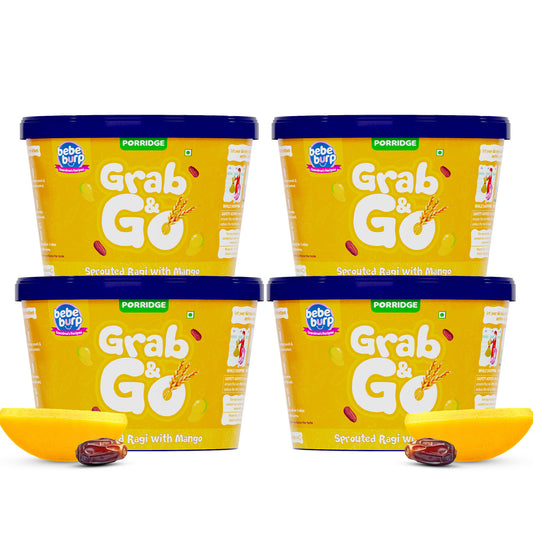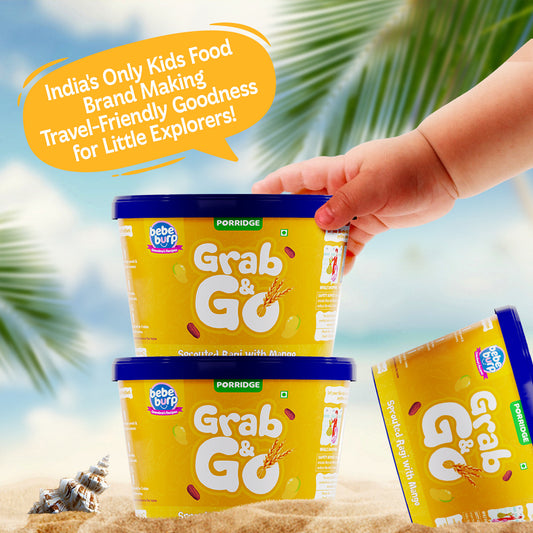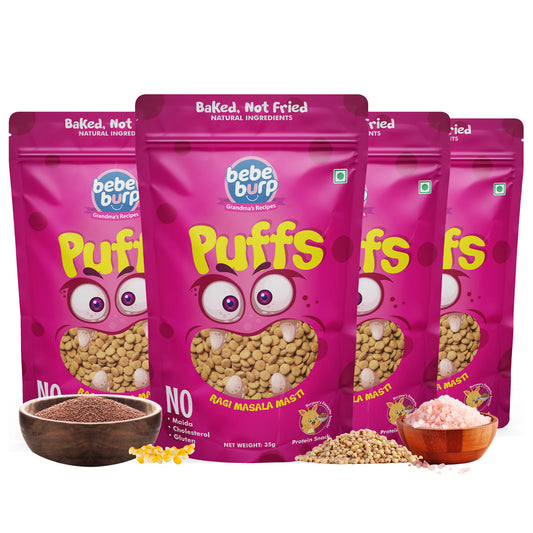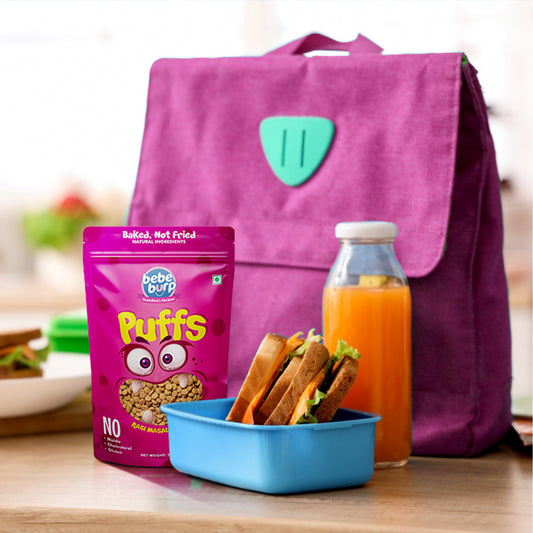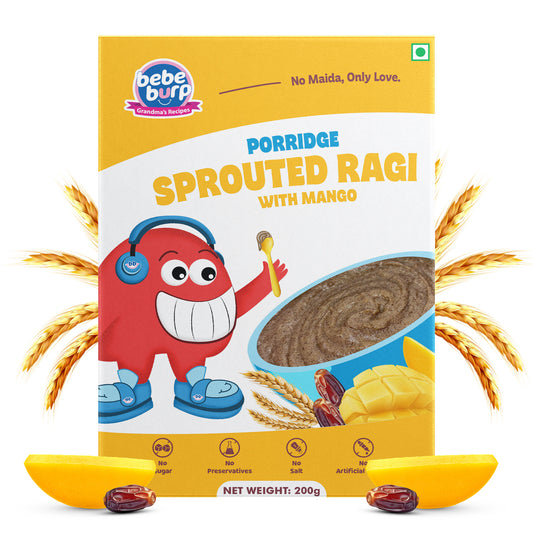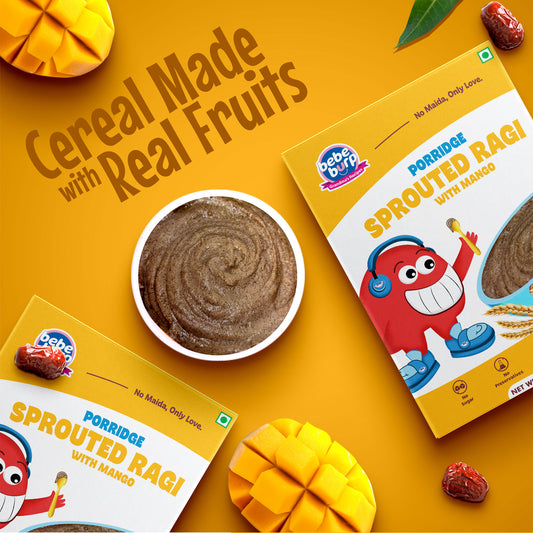Did you know that 70% of commercial baby foods contain added sugars, often disguised as 'natural' ingredients like fruit juice concentrate or honey? Buyer confusion about baby food selection exists because misleading labels, along with sophisticated advertising, obscure the selection process.
Parents frequently believe they serve healthy meals to their babies, although these meals contain artificial additives and large amounts of sugar.
With this guide, you can cut through all the confusion and confidently pick the best baby food brands that deliver good nutrition despite convenience requirements.
Bebe Burp dedicates its efforts to maintaining total ingredient transparency while using organic farm sources that exclude all added sugars in its products.
All our products contain pure organic millet porridge alongside vegetable-based porridges, plus we eliminate both artificial sweeteners and fruit concentrates from our products.
Our basic range of single-component products helps your baby experience healthy daily growth. Pure, nutritious food without compromises must always be provided to your baby.
The Sugar Crisis in Baby Food
 When you consider baby food made from fruits, you likely believe these options deliver maximum health value since fruit contains natural sugars.
When you consider baby food made from fruits, you likely believe these options deliver maximum health value since fruit contains natural sugars.
The fact that a product is tagged "natural" does not indicate a total absence of sugar content.
Numerous baby food brands utilize concentrated fruits in their items, although these compounds carry elevated sugar levels.
Special attention should be given to baby-sized food portions due to the high fruit-based sugar content that can exceed their dietary needs.
A packaged apple puree appears simple yet contains an unexpected amount of sugar hidden within its contents.
Even though natural sugar from apples exists in the puree, there are also fruit concentration additives that boost the sweetness level.
These products may use fruit concentrates but provide excessive amounts of sugar, which can be disconcerting for parents.
Health Risks: The Hidden Dangers of Sugar
 The early introduction of added sugars elevates the chances of numerous health issues affecting babies and children.
The early introduction of added sugars elevates the chances of numerous health issues affecting babies and children.
The U.S. Dietary Guidelines, along with the FDA, maintain that infants younger than 2 years need no added sugars in their diet to decrease the likelihood of cavities obe, obesity, and diabetes.
Explanation of Health Risks:
- Cavities: Repeated exposure to sugar allows dangerous mouth bacteria to multiply, thus promoting tooth decay and cavities.
- Obesity: Most infants who consume large amounts of sugar tend to put on too much weight, which heightens their chances of developing obesity as adults.
- Diabetes: Type 2 diabetes can stay in remission when babies get a restricted sugar diet after birth through their second year of life.
Recommendations for Parents:
- All forms of added sugar should be restricted from the diets of children who are less than 2 years old.
- Teaching proper eating patterns becomes vital during children's early development period.
- Natural sugars from milk and unsweetened dairy items, along with fresh fruits, make acceptable sources of sugar for infants and toddlers.
- People should consume water or unsweetened milk instead of sweet drinks.
Other Health Effects:
- Regular large consumption of added sugars increases the potential for hypertension, which causes a higher chance of heart disease during older years.
- Intake of sugar in early stages might cause adverse effects on both physical development and organic growth patterns.
- Schoolwork performance and learning capabilities of children often become affected by excessive sugar consumption.
The guidelines, together with controlled sugar intake in children's diet, help parents create better health outcomes for their children's future.
Industry Loopholes: Expose how brands use loopholes
 Foods labeled "No Sugar Added" are likely to appear in baby products, but the absence of added sugar does not mean they lack sugar content completely.
Foods labeled "No Sugar Added" are likely to appear in baby products, but the absence of added sugar does not mean they lack sugar content completely.
It is a scheduling ploy that companies employ to market their products where the absence of added sugars in the product does not indicate complete sugar elimination.
This label serves brands as a deception tool that allows them to hide the extensive natural sugar content present in their products, which frequently stem from fruit purees or juices.
Although they do not add actual sugar, the products contain high amounts of natural sugars that are masked as hidden sugar in your child's food.
False nutrition labels hide dangerous risks, which include fast tooth decay along with obesity and future diabetes development.
So, don't be fooled! Before serving your child's meal, always confirm all ingredients by checking the product label to guarantee healthy and low-sugar nourishment.
Case Study:
Compare Brand X apple puree against Bebe Burp's millet porridge. The sugar content in Brand X apple puree reaches 10g per pouch, whereas Bebe Burp millet porridge contains only 2g of natural sugar. That's a huge difference!
Key Factors to Evaluate When Choosing a Brand
 Your analysis of specific safety factors necessary for baby nutrition must guide your choice of the best brand for your child.
Your analysis of specific safety factors necessary for baby nutrition must guide your choice of the best brand for your child.
Users should evaluate multiple factors when selecting a baby food brand, as illustrated by Bebe Burp.
Read Ingredients for Red Flags
Scan ingredient lists to identify possible unsafe components, which include artificial flavours and preservatives as well as hidden sugars under terms like "evaporated cane syrup".
Your child's health, together with their development, may suffer from these ingredients.
Bebe Burp’s Edge: Simple, Clean, and Natural
 Bebe Burp distinguishes itself by using sustainable single-ingredient products that maintain purity in their ingredients.
Bebe Burp distinguishes itself by using sustainable single-ingredient products that maintain purity in their ingredients.
The organic millet porridge from this brand does not contain any additives because the brand believes in providing natural food options for babies.
Decoding Labels: What to Look For
The knowledge of effective nutrition label reading stands as an essential factor to help in making educated decisions.
The amount of total sugars and added sugars must always be checked when selecting products because excessive sugar consumption leads to health problems as your child grows older.
Bebe Burp's Promise:
Each product contains a total absence of sugar additions. Vegetable-based blends receive priority over fruit-based blends because they provide essential nutrients to your baby in a way that limits excessive sugar consumption.
Certifications & Safety
 Organizational security, together with materials quality, remain critical main concerns.
Organizational security, together with materials quality, remain critical main concerns.
Brands that endorse certifications and testing methods prove their dedication to creating safe, health-conscious products for children.
Organic Certification:
Consumer concerns about heavy metal contaminants in baby food feed have prompted Bebe Burp to test all products according to USDA Organic-equivalent standards.
Sustainability:
The brand advances environmental standards while delivering environmental responsibility beyond its food safety commitment.
The production process at Bebe Burp keeps its ingredient acquisition carbon-emission-free while employing sustainable packaging materials, thus becoming an environmentally friendly option for your baby's needs.
Choose brands that provide clear labelling about their ingredients and certifications while supporting sustainable operations.
Moreover, use brands that do not contain hidden chemicals in their products.
Bebe Burp satisfies all parental safety requirements with its baby food, thus bringing comfort to the selection of food products.
Beyond Sugar: Nutritional Priorities

Protein & Healthy Fats
Critique of Fruit Purees: The majority of brands use fruit purees as their main ingredient, yet these foods contain minimal amounts of protein and healthy fats.
Fruits provide vitamins and fibre but do not supply the necessary elements essential for muscle development and brain growth along with satisfaction.
Bebe Burp's Advantage: Bebe Burp's ragi cookies have iron and fibre content, which provides your baby with plant-based proteins that aid its growth while maintaining its extended period of feeling full.
Developmental Benefits:
The Issue with Sweet Flavors: Using fruit purees encourages an automatic liking of sweet tastes while decreasing the willingness to consume savoury foods, which may result in future picky eating problems.
Bebe Burp's Solution: Vegetable-based porridges from Bebe Burp expose babies to savoury flavours at an early age, thus developing their taste for a wide range of foods during their growth.
The Bebe Burp Difference: A Parent’s Testimonial
A Parent’s Journey: From Frustration to Relief
As a mom, I gave my daughter Emma those sugary fruit pouches because they were quick and easy, especially on busy days.
But after a while, I started feeling uneasy about all the artificial sugars and preservatives in them. It just didn't feel right to me, knowing what was inside.
Then, I discovered Bebe Burp. I was so relieved when I saw their label—just real fruits and veggies, no artificial ingredients.
I decided to give it a try, and Emma loved it! The best part? I didn't have to stress about what I was feeding her anymore.
Bebe Burp has made snack time much more manageable and healthier for us. I finally feel good about the snacks I'm giving my little one.
Product Spotlight: Our Bestsellers
 1. Wheat Cookies (No Refined Flour)
1. Wheat Cookies (No Refined Flour)
Wheat cookies were created with the ideal nutritional profile for parents to approve.
These wheat flour-based snacks deliver health advantages because they contain no refined flour elements, so your child can enjoy their crunchiness.
Our cookies contain natural sweetness because they include no artificial additives and make an ideal snack for any moment, including quick trips.
2. Millet Porridge (Low Glycemic Index)
Our Millet Porridge serves as a nutritious and delightful meal option that contains multiple beneficial aspects.
The low glycemic index in this food helps children maintain steady energy levels because it serves as a healthy breakfast or satisfactory between-meal snack option.
This digestive-friendly porridge carries all the necessary nutritional elements suitable for developing children.
Downloadable Guide: Baby Food Label Evaluation Checklist
We’ve created a helpful checklist to make evaluating baby food labels easier. Download your free PDF guide now to ensure the best nutrition for your little one.

Conclusion
Finding appropriate baby foods can seem challenging; however, understanding key information empowers parents to decide on nutritious and secure food for their baby.
Home-made baby food stands out as the best option since some commercially available products lack equal nutritional worth.
Bebe Burp delivers safe and nutrient-rich transparent products that guarantee complete trust with our customers.
The best version of care must be available to your newborn child and yourself as well.


